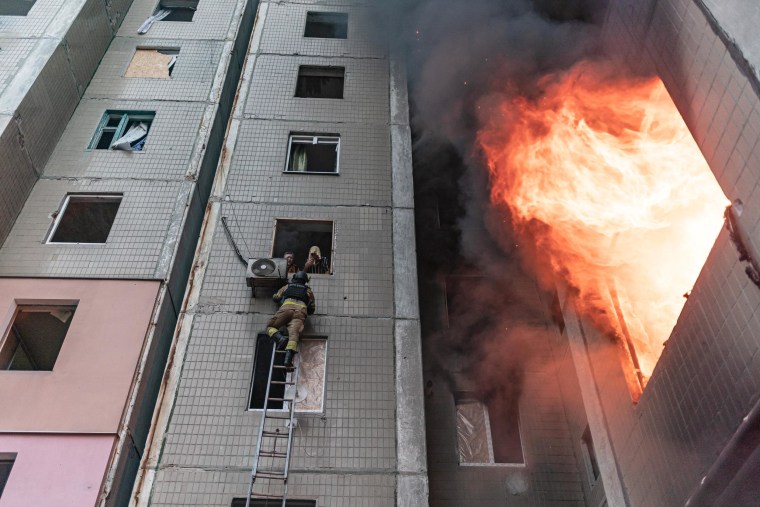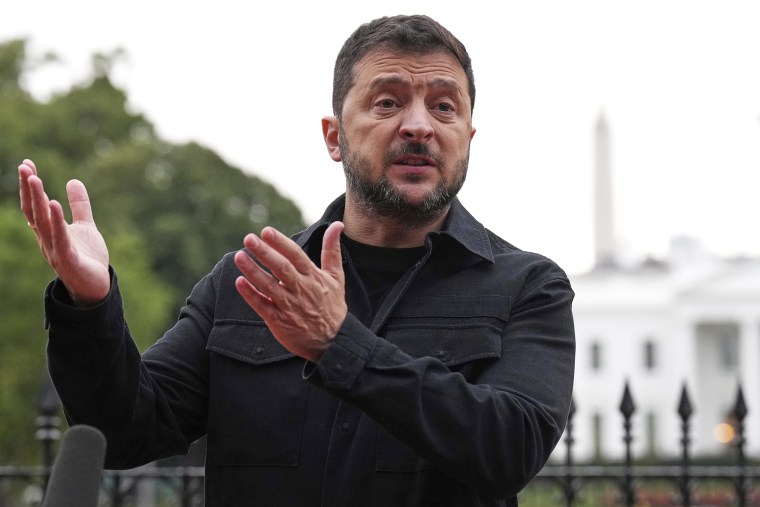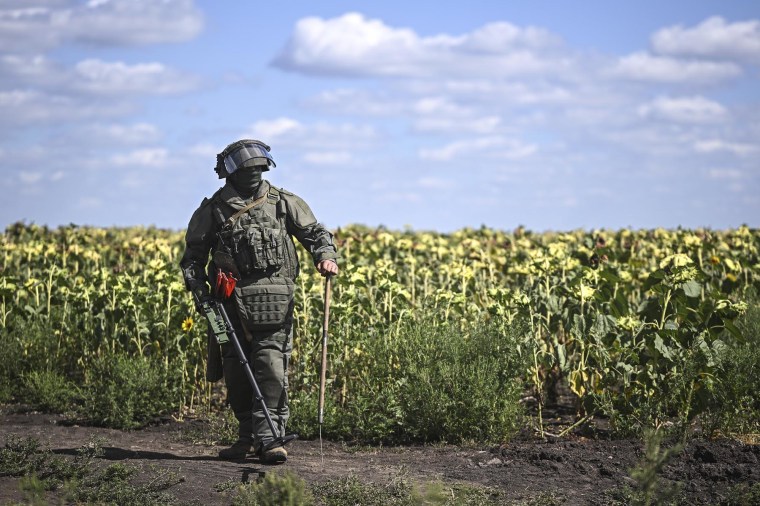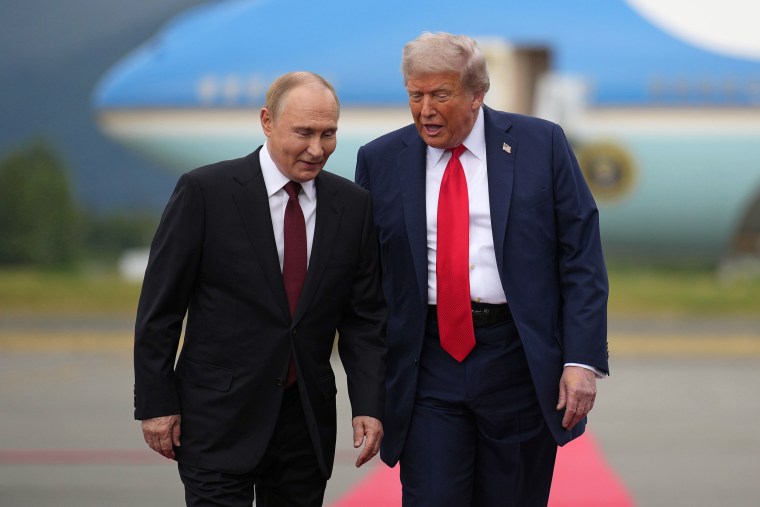Russia’s top diplomat laid out the wide gaps between Moscow and Kyiv and put a damper on hopes that President Donald Trump will propel a swift end to the war in Ukraine.
Foreign Minister Sergey Lavrov told NBC News’ “Meet the Press” moderator Kristen Welker in an exclusive interview taped Friday that there was no meeting planned between Russian President Vladimir Putin and Ukraine’s Volodymyr Zelenskyy, and that key issues — including security guarantees for Ukraine and territorial disputes— remain unresolved.
Putin “is ready to meet with President Zelenskyy, provided this meeting is really going to decide something,” he said. “To meet, for Zelenskyy to have another opportunity to be onstage, is not what we believe is useful.”
Even as Trump has met separately this month with Putin, Zelenskyy and European leaders, his overtures for peace have been undermined by Russia’s continued deadly strikes on Ukraine, including on a U.S.-owned factory last week.
The White House is now seeking a Putin-Zelenskyy summit, but Lavrov’s grievances underscored just how far apart the two sides remain.
He said it was Ukraine that was hindering the peace process, along with European leaders who Lavrov said “don’t want peace.”
“They say, ‘We cannot allow defeat of Ukraine. We cannot allow Russia to win.’ They speak in these terms: win, defeat and so on,” he said.
Ukraine, which celebrated its independence day on Sunday, is being pressured to give up Russian-annexed Crimea as well as its eastern Donbas region and abandon any hope of joining NATO, the U.S.-led military alliance founded after World War II to counter the threat posed by the Soviet Union.
“Zelenskyy said no to everything,” Lavrov said. “How can we meet with a person who is pretending to be a leader?”

Russian invasion
Lavrov, whose country launched a large-scale invasion of Ukraine in 2022, claimed Russia had “proposed several times a peaceful resolution on a diplomatic basis.”
Russia has been unwilling to discuss giving up the 20% of Ukraine it occupies, and insists that Ukraine remain nonaligned and unarmed.
When Welker pressed him on whether Russia had indeed invaded Ukraine, Lavrov declined to use the term, instead using Russia’s preferred phrase of “special military operation.”
Lavrov acknowledged that Ukraine “has the right to exist” but said it must “let people go.”
Putin has long claimed, without evidence, that Kyiv has committed genocide against Russian speakers in Ukraine’s eastern Donbas region, almost all of which his forces now occupy.
Russia doesn’t have “any interest in territories,” Lavrov said, but is concerned about people identifying as ethnically Russian “who live on those lands, whose ancestors lived there for centuries and centuries.”
Most of the international community rejects the idea that Ukraine is repressing Russian language and culture and says Russia launched its invasion under false pretenses.

Civilians under fire
Russia has killed or injured close to 50,000 civilians during the war including in strikes on maternity wards, churches, schools and hospitals, U.N. experts say, with civilian casualties reaching a three-year monthly high in July. Last week, a kindergarten was among the dozens of buildings hit in a deadly Russian strike on the western city of Lviv.
“Either the Russian military has terrible aim or you are targeting civilians,” Welker said. “Which is it?”
Lavrov said Russia only targeted sites linked to the Ukrainian military.
“We never targeted the civilian targets of the kind you cited,” he said, going on to say it was Ukraine that was “purposely” hitting churches and civilian settlements. Ukraine denies targeting civilians.
Overnight Thursday to Friday, Russia launched its largest assault since early July, firing nearly 600 drones and 40 ballistic cruise missiles, including at a U.S.-owned factory in western Ukraine that makes coffee machines and other electronics. At least 15 workers were injured.
Lavrov said that he had not heard of the factory incident, but that some people are “really naïve, when they see a coffee machine in the window, when they believe that this is the place where coffee machines are produced.”
Flex Ltd., the Texas-based company that owns the factory, said in a statement last week that the factory is “strictly focused on civilian consumer manufacturing” and “does not produce, supply, or support any military equipment or defense-related components.”

Putin and Trump
Russian attacks on Ukraine have doubled since Trump took office in January and continued during talks with Putin in Alaska, leading some lawmakers to ask whether Putin is stringing Trump along.
“If President Putin has so much regard for President Trump, why is he taking actions that are undermining his push for peace?” Welker asked.
Lavrov said Putin respected Trump’s focus on the U.S. national interest, and that he believed “President Trump respects the same attitude of President Putin to protecting national interests of Russia.”
Whatever Trump and Putin discuss “is not a secret” and both leaders “want peace in Ukraine,” he said.
On Friday, Putin praised Trump and said that it might be possible for the U.S. and Russia to fully restore relations he said were at “an extremely low point.”
“With President Trump, I believe that a light at the end of the tunnel has nonetheless appeared,” he said, calling their meeting in Alaska “very good.”

Security guarantees
Lavrov addressed Russian demands that it should be a part of any international talks on Ukraine’s security after defense chiefs from the U.S., U.K., France, Germany, Italy, Finland, Ukraine and NATO met Wednesday to hash out protections that Kyiv’s allies could offer in a deal.
“Security guarantees must be subject to consensus,” he said, claiming Russia had presented security guarantees “several times.”
Putin is ready to meet with Zelenskyy “when the agenda is ready,” Lavrov said. But he suggested that Putin would not sign a peace agreement with Zelenskyy, whose legitimacy Moscow has questioned since Ukrainian elections were postponed last year amid martial law.
“When we come to a stage when you have to sign documents, we would need a very clear understanding by everybody that the person who is signing is legitimate,” he said. “And according to the Ukrainian constitution, Mr. Zelenskyy is not at the moment.”
On Friday, optimism appeared to be on the wane in Washington.
In a separate interview with Welker, Vice President JD Vance said Russia had made “significant concessions” to Trump, including recognizing Ukraine’s “territorial integrity” after the war and not trying “to install a puppet regime in Kyiv.”
But Vance acknowledged there were “hills and valleys” in the negotiations. “We’re going to eventually be successful, or we’ll hit a brick wall,” he said.
Trump also appeared to temper his expectations.
“We’ll see what happens,” he told reporters on Friday. “I think over the next two weeks, we’re going to find out which way it’s going to go. And I better be very happy.”
“It’s going to be a very important decision, and that’s whether or not it’s massive sanctions or massive tariffs, or both,” he continued. “Or do we do nothing and say, ‘It’s your fight.’”
